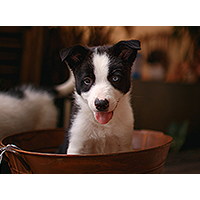The Puppy Basics: Taking Care of Your New Dog
Author: Pet Station Date Posted: 4 March 2021


Getting a new puppy can be life-changing, especially if it’s your first time taking care of one. Puppies are indeed a lot of work, but they can bring joy and remove stress from your world, however, parenting a new puppy is definitely not a walk in the park, and you will need to have at least a basic knowledge of taking care of a puppy and what's involved.
When the time comes that you’ve finally decided to bring home a puppy, there are three things that you can count on: unending joy, cleaning up your puppy’s mess, and a significant lifestyle change. You will also learn that a growing puppy needs much more than a food bowl and a doghouse to survive. While it may take a lot of work initially, it is undoubtedly worth the effort. Apart from establishing excellent and healthy habits in your puppy’s first few weeks, here are some of the basics that you must know.
Look for a Good Vet
When bringing home a puppy, the first thing you need to do is to look for a good vet. Once you’ve found one, you should pay a visit to the vet to ensure that the puppy is healthy and free from any serious health conditions, birth defects, and other things. This first checkup can also be the initial steps toward a good preventing health routine. If you are unsure where to look for one, you can ask your friends for any recommendations. If you have adopted a puppy/dog from a shelter, you can ask for their advice as they may have veterinarians they work closely with. Groomers and dog walkers can also be a great source of ideas.
Ask Questions on your first visit to the Vet
During your initial visit to the vet, ask questions about what food he or she recommends, how often to feed, and how much you should feed your dog. Apart from that, be sure to also:
- Schedule your Puppy’s Vaccinations
- Discuss safe options for controlling worms and parasites
- Learn what symptoms are normal and signs that your puppy has an illness
- Ask about when you should spay or neuter your dog
Shop for quality Dog Food
What you feed your puppy plays a significant role in their growth and development. This is why it is crucial to select a formulated dog food, especially for puppies as opposed to adult dogs. Here at Pet Station, we have a wide range of puppy food that can meet all of your pup’s nutritional requirements. For small and medium breeds, you can change their food to adult ones between 9 and 12 months of age. For large breed dogs, you should stick to puppy kibbles until they reach 2-years-old. You also need to make sure that they have fresh and abundant water accessible at all times.
Here’s how often you should feed your dogs:
- Age 6-12 weeks – 4 meals per day
- Age 3-6 months – 3 meals per day
- Age 6-12 months – 2 meals per day
Set up a Bathroom Routine
Since puppies don’t enjoy wearing nappies, housetraining is one of the top priorities of puppy owners. When training or establishing a bathroom routine for your dogs, you need a lot of patience, planning, and positive reinforcement. If you have carpet in your home, make sure to have a carpet-cleaning battle plan because you’ll never know when accidents will happen. You also need to make sure to give a lot of positive reinforcement whenever your puppy manages to potty outside and refrain from punishing the pup when accidents happen indoors.
Another thing you should be familiar with is knowing when to take your puppy out to eliminate accidents indoors. Below is a list of common times to take your puppy outdoors:
- After waking up.
- Before going to bed.
- After your puppy eats or drinks a lot of water.
- After your puppy wakes up from a nap.
- During and after any physical activity.
Watch for Early Signs of Sickness
During the first few months, puppies are more vulnerable to sudden bouts of sickness, leading to serious disease if not caught in the early stages. If you have noticed any of the following symptoms in your puppy, be sure to contact your vet immediately.
- Lethargy (tiredness)
- Vomiting
- Lack of appetite
- Diarrhoea
- Poor weight gain
- Wheezing or coughing
- Difficulty breathing
- Pale gums
- Swollen, red eyes, or eye discharge
- Inability to pass urine or stool
- Nasal discharge
Train your Puppy
When raising a puppy, you need to make sure that you teach them good manners. This can help set your puppy up for a life of positive social interaction. Training your pup will also forge a stronger bond between you and your puppy. Training your dog to obey simple commands such as stay, sit, down, and come will not only impress your house visitors and friends, but these can also help keep your dog safe and under control in any potentially dangerous situations. Many puppy owners find that obedience classes are effective in training both the owner and the dog. Classes usually accept puppies at age 4 to 6 months.
Pro tip: Always keep the training positive. Use positive reinforcement such as small treats to effectively train your puppy.
Don’t forget to Socialize with your Puppy
Just like obedience training, proper socialization during puppyhood can help avoid different behavioural issues during adulthood. During 2 to 4 months of age, most puppies are starting to accept other animals, people, places, and experiences. You can sign up with socialization classes to rack up positive social experiences for your puppy. You can ask your vet about what socialization is acceptable for your puppy’s age.
Here at Pet Station, we understand that you always want what is best for your animals. If you are looking for the best pet food, vitamins, and supplements for your puppy in Australia, we’ve got you covered. Feel free to browse all our dog food, healthcare, and supplies, and if you have any questions about our range of products, get in touch with our friendly and experienced team members who are happy to go above and beyond for you and your furry friends.





